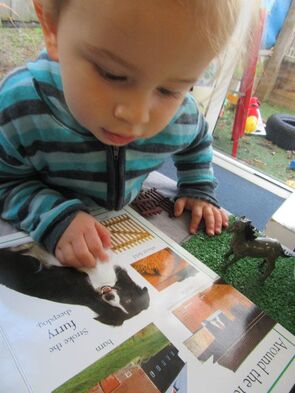Kids' Kampus
 Our brains develop from before we’re born and into adulthood, and we’re born with 100 billion brain cells and 50 trillion neural connections (synapses)! During our first few months, these connections multiply, and by the time we’re 5, our brains have already formed 90% of connections. That means that experiences during these early years are crucial in shaping brain development. Positive experiences encourage healthy brains throughout childhood, but there are some key “sensitive periods” where brains are even more affected by positive or negative experiences. While your child is navigating their way through the world, sensory experiences help their brain cells to create new connections, while repetition of these experiences strengthens them. This is the time your child is absorbing information and learning new skills, and so stimulating their brain is key for improving their thinking and understanding. Ways to stimulate brain development in children 1. Play Children love to play, but it’s also one of the fundamental ways they learn. It’s vital for stimulating their imagination and creativity, as well as developing their memory and learning how to plan and organise. Play helps to develop a child’s “theory of mind”, or the ability to walk in someone else’s shoes. For example, what would this character think? or am I showing compassion for my teammate? 2. Relationships A child’s relationships have the greatest impact on their relationships in adult life. This includes relationships at home, but also with teachers, child care providers and other members of the community. Being attentive and interacting with your little one helps to build their brain, providing a safe and nurturing environment for them to explore their world. 3. Talking & reading The more you talk to your child, the more brain cells will get moving, and the more they’ll absorb. By using full sentences, instead of single words or shortened sentences, you can stimulate their vocabulary. When you’re reading together, ask questions to invite discussions. Aim to answer all of their questions (we know, there can be a lot of them!) as this shows your child taking an active role in their own learning, and helps to develop critical thinking skills. 4. Music Music stimulates and engages all areas of the brain, and offers more benefits than just a chance to have fun dancing around with your child. Music experiences have been shown to accelerate brain development in the areas of language acquisition and reading skills, but can also boost social-emotional skills, motor skills, and overall literacy. 5. Movement Encouraging your child to move and exercise is great for their physical development and their mood. In fact, scientists have found that the brain is more receptive to learning after exercise, and that movement enables neural connections essential for learning to take place. In both children and adults, movement is linked to better executive functions, ie. the skills we use to focus, plan and juggle information. Of course, there are many more early experiences that can positively impact a child’s brain development, and here at Kids Kampus, we’re dedicated to providing the nurturing space that helps your little one reach their potential. To find out more about what we do, get in touch on [email protected] or (09) 630 1454.
0 Comments
|
.Margie Blackwood, owner and Director of Kids' Kampus
April 2024
. |
|
Kids’ Kampus Childcare
50-52 Shackleton Road Mt Eden, Auckland 1024 New Zealand |
|






